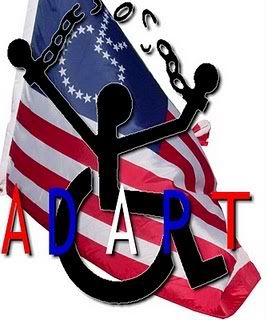From the MD Daily Record, written by Joe Surkiewicz, published Jan 2, 2011
BALTIMORE, MD -- While most of the 25,000 residents living in Maryland’s 234 nursing homes would prefer to receive services at home, the overwhelming majority languish in institutions.
That’s largely because they don’t know their options.
But thanks to The SunShine Folk, that’s changing.
The SunShine Folk are a group of former nursing home and state institution residents who reach out to residents in nursing homes and educate them about their options for receiving long-term care at home.The group was launched by Maryland Disability Law Center in 2005 as a collaboration between people with disabilities who provide hands-on peer support and the MDLC, which provides the legal expertise to help secure the Medicaid waiver services needed for them to live independently.“The SunShine Folk help facility residents choose and apply for Medicaid programs and advocate for themselves in the transition process,” said Gayle Hafner, a senior attorney at MDLC. “MDLC staff work to remove legal barriers in the more difficult cases.”This successful partnership between legal professionals and grassroots advocates has enabled hundreds of people with disabilities — including seniors and individuals with significant support needs — to fulfill their dream to move from an institution to the community and “get their lives back.”It also makes economic sense.“Any time it costs the state $85,000 a year to live in a nursing facility and only $40,000 a year at home, coming home is the way to go,” said Floyd Hartley, a leading member of The SunShine Folk. “I was in a nursing home for three years and never knew about waiver services until I met Gayle [Hafner]. It allowed me to come home and get the same level of care — actually, better care that is much more individualized.”The group not only serves individual clients but also has its collective fingers on the pulse of the state’s progress in rebalancing its long-term care system away from over-reliance on facility-based care.The SunShine Folk have gained experience, knowledge and savvy and have positioned themselves to advocate successfully for systemic reforms that help improve the lot of many people who remain stuck in institutions.Furthermore, the program serves people who face complex legal hurdles, have intensive-care needs or face other barriers to freedom from facility-based care requiring skilled and sustained assistance.“Experience tells us that the majority of individuals the SunShine Folk have helped to free would still be stuck in institutions, but for the program’s tenacious outreach and persistence,” said Kim Stevens, an MDLC paralegal who works closely with The SunShine Folk.“Although most individuals prefer to receive services at home, Maryland spends about 85 percent of its Medicaid funds on institutional care,” Stevens continued. “Maryland spends only 15 percent of its Medicaid long-term care monies on home and community-based services and supports for seniors and individuals with disabilities, ranking it near the bottom among states in home-care services spending for this population.”A federal demonstration grant, Money Follows the Person, attempted to address this imbalance. Due to the success and advocacy of the SunShine Folk, the state attempted to incorporate peer outreach contractors, program education and waiver application assistance into its MFP operational protocol.“The sustained monitoring by The SunShine Folk clearly reveals that the state’s initiative falls far short of the intent,” said Hafner, the MDLC attorney. “Nearly 100 percent of the residents who connect with The SunShine Folk choose to initiate a waiver application, while only 30 percent of those who interact with the state’s program educators choose to do so.”At least part of the reason is that the state’s contractors are restricted in the information they can share and are less committed to helping people find their way home.The SunShine Folk, on the other hand, are able to respond to all of the residents’ concerns and requests for information, and support the individuals throughout the transition process.“Just within the past few months we have made several presentations at conferences about this peer model of mentoring, and people are always asking how to replicate the model for other projects or in other states,” Hafner said.“The SunShine Folk have been an invaluable resource, an on-the-ground eyes and ears for many advocacy groups,” she continued. “The state policymakers recognize The SunShine Folk’s real-life experiences and actually listen to them because of their knowledge, dedication, and commitment.”The SunShine Folk keep hope alive for people during a complicated transition.
“Sometimes the social work aspect of transitioning a person with complex needs requires more resources than a legal services agency is equipped to offer,” Hafner noted. “The SunShine Folk can be the knowledgeable, one-on-one contact and mentor for someone during the entire process, from thinking about the possibility of transition, all the way through settling into a new home in the community.”Added MDLC executive director Virginia Knowlton: “You can replicate the model, but not the passion for the work and sincere desire to help people find their way out to the community that our advocates have. This is an effective collaboration that grew organically from the ground up in response to a pressing human need.”For information about The SunShine Folk project, call Knowlton at 410-727-6352.Joe Surkiewicz is the director of communications at Maryland Legal Aid. His e-mail is jsurkiewicz@mdlab.org.

















1 comments:
Great post! I'm a firm believer that with the right amount of support, people thrive at home much more than then do in care-facilities. Although I cringe at analogies that try to break people down into cost measurement units, because I believe that people are more than widgets in the health care factory, if such analogies and comparisons get lawmakers to open their eyes, then so be it. (But still, I'd prefer lawmakers to treat people fairly because it's a right and not just because it makes economic sense. I can still dream that one day that will happen, right?) - G
Post a Comment